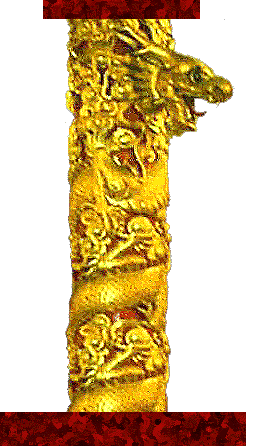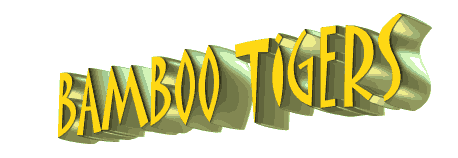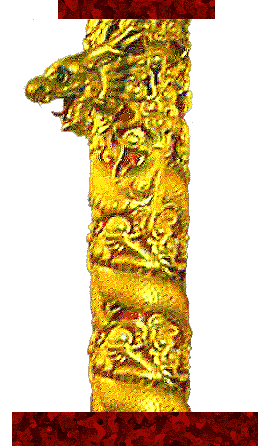| |
Many Triad members came from the lowest ranks of the population in Hong Kong--tenement dwellers or street people. The criminally active generally ranged in age from 15 to 24, were neither in school nor employed at an occupation, and had a strong desire to enter the shadowy world of organized crime either for financial gain or to achieve status in gang society. These types formed a minority of the membership. The majority joined in the misguided belief that it was the only way to avoid harassment or to enjoy the use of recreational or communal facilities, nearly all of which were Triad-controlled.
The use in English of the word "Triad" ("a group of three") denotes the sacred symbol of these secret societies--a triangle enclosing a modification of the Chinese character known as hung. The use of hung derived from Hung Wu, the royal title of the patriot who founded the Ming Dynasty in 1368 A.D. Hung Wu's reign heralded a golden age of prosperity in China, ended by the Manchu conquest in 1644.
Hung, by itself, had no meaning, but its enclosure within the three-sided geometric figure symbolized the union of Heaven, Earth and Man. When Triads--the offspring of ancient societies--formed after 1644 to fight for independence from Manchu rule, they devised the triangle-protected hung as a holy symbol of their purpose, which was to drive out the conqueror and again achieve for China that perfect union of Heaven, Earth and Man.
Triads were variously known, from the 17th century to the present day, as Hung Mun ("Hung Association"), Tin Tei Wui ("Heaven and Earth Association"), Saam Hop Wui ("Three United Association") and, most recently, as Hak Sh'e Wui ("Black Society Association"), a name befitting their descent from patriotic glory into criminal infamy.
Membership in a Triad society traditionally began with apprenticeship leading to full initiation involving three days of ritual called Hung Mun. On the walls of the chosen place, designated a "lodge," were hung Triad insignia including representations of the mythical Triad capital city, Muk Yeung. A Heung Chu, "Incense Master," presided over the rites. Blood was drawn from one of each recruit's fingers by the Heung Chu, tasted first by the recruit himself, then added to a communal bowl from which everyone drank to signify blood-brotherhood. Adherents subscribed to 36 oaths, 21 codes, 10 prohibitions, 10 penalties and 10 mottos.
In 1956, most ritual initiations were suspended for security reasons, but at least one oath of allegiance continued to be sworn. Of the old 36, most telling was the 13th: "If I should change my mind and deny my membership of the Hung family, I will be killed by a myriad of swords." Spoken or not, that oath never lay far from implementation if forsworn.
Although it was known that initiation practices had been minimized or often dispensed with entirely, Triads continued to spread into Europe and North America with immigrants from Hong Kong and Taiwan. The system infiltrated Chinese Freemasonry in Canada. Incidents were identified in the Netherlands as Triad-connected, and in August 1977, a gang of youths wielding meat cleavers, knives and swords attacked two dissident Triad members in a Chinese restaurant in Bayswater, England. This was no mean echo of the famous 13th oath.
Before 1956, initiation rites frequently took place in temples or cemeteries, locales which fostered a sense of both spiritual and eternal commitment. It was believed that ritual entry into the sacred bond of Taoist-oriented Triad confraternity signified rebirth. Recruits took part in the ceremony of Kwa Lam Tang Lung, "Hanging the Blue Lantern." In China, a blue lantern placed outside a house--paralleled in Occidental culture by the black wreath hung on front doors --announced a recent death. One had to "die" before resurrection into new life as a Triad brother.
Although joining a Triad society implied a willingness to commit mayhem and murder on command, initiations after 1956 more closely resembled acceptance into a service club like the Kiwanis or the Rotary. The Sen Wei Yuen, "new soldier," was proposed for membership by a Tai Lo, "elder brother," meaning mentor. The new man was required to pay a fee and swear allegiance before receiving instruction in secret signs of mutual recognition.
This oath of fealty became the pressure point of a recruit's future association with the society. Upon uttering it, he locked himself into the Triad for life. There was no breaking out. The member might someday retire from active duty, but he could be recalled without explanation, at any point in time, to give financial aid or other, more sinister, support--such as hiding fugitive "brothers," arranging complex and expensive escapes from Hong Kong, or setting up the transfer of drugs to Europe and North America.
A series of arrests of drug couriers by United States Customs agents and the Drug Enforcement Agency (the D.E.A.) in the early 1970's uncovered links with the Chiu Chau Society of the Triads in Hong Kong and Taiwan. The Chiu Chau's involvement with drugs traced back to the mid-19th century when, from Hong Kong, they supplied opium to the fabled dens of Shanghai.
The Shanghai-based Ching Pang, famed worldwide as the "Green Gang," usurped the Chiu Chau's opium trade in the 1920's. The Ching Pang distributed an "anti-opium" pill--consisting mainly of heroin supplied by European and Japanese pharmaceutical companies--and touted it as "the best medicine in the world." Heroin quickly replaced opium among thousands of unfortunate Chinese who sought release from the opium habit. The Ching Pang prospered while the Chiu Chau's business declined in Shanghai.
A Geneva Convention imposing a ban on heroin was adopted in 1928 by the United States, several European nations and Japan. The Conventions were a series of international treaties formulated during the years 1864 to 1949, signed by representatives meeting in Switzerland, usually dealing with the treatment of combatants and civilians in wartime. The 1928 Convention quelled the tide of heroin flowing into Shanghai. The Ching Pang countered by setting up laboratories to refine heroin from raw opium smuggled from the poppy fields of Southeast Asia. These developed into the leading source of heroin for both China and the world market.
Following the Second World War, the Ching Pang, recognizing the impending danger posed by Mao Zedong's Red Front, exported their chemical expertise to Hong Kong. The move constituted an invasion of Chiu Chau territory and, as a maneuver, proved to be a fatal tactical error. Turf control was a primal law of Triad operation. Firmly established on its home ground and supported by highly placed officials and powerful gangs, the Chiu Chau exacted revenge of their blundering enemy in a series of successful affrays. When the Ching Pang collapsed into insignificance, the Chiu Chau pirated their sophisticated heroin technology.
Ironically, the formation of the Royal Hong Kong Police Force Anti-Triad Unit in 1956 served no one more than the Chiu Chau. Having consolidated themselves as the chief manufacturer and wholesaler of heroin in the Crown Colony, the Chiu Chau turned a greedy eye toward the retail market. Controlled by other secret societies, gangs and Cantonese Family Associations, retail distribution represented a many-splendored rainbow at the foot of which the greatest profits lay.
In October of 1956, the dedicated crime fighters of the Anti-Triad Unit crashed into the secret societies, the gangs and the Cantonese Family Associations, splintering them all into temporarily impotent fragments--except for the Chiu Chau. The retail heroin traffic then fell under the Chiu Chau's absolute sway.
By the 1970's, however, the societies, associations and gangs had regrouped. Of at least 80,000 Triad members in Hong Kong, only 10 percent were thought to actively engage in criminal activity at any given time. The remaining 90 percent comprised those who had become disinterested upon reaching maturity or who had gone successfully into business and no longer needed gang status.
In modern times, Chinese secret societies had played a dynamic role not only in China's criminal underworld, but also in its political life. Dr. Sun Yat-sen became a Triad member in 1890 for the purpose of reorganizing them into guerrilla units to deploy in the final overthrow of the hated Ch'ing Dynasty of the Manchu.
Accomplishing this aim in 1911 with the revolution begun on October 10th--a day still celebrated in San Francisco's Chinatown as "Double Ten" or "Ten-Ten" (the 10th day of the 10th month), Dr. Sun declared China a republic on January 1, 1912. Shortly thereafter, he visited the tombs of the Ming emperors near Peking and announced to the spirits of the deceased that China had been set free, after 268 years of "foreign" rule, by exclusively Chinese efforts. Aside from its obviously nationalistic intent, this declaration, and the site where it was made, were interpreted by many as direct tribute to the assistance rendered by the Triads. These societies were, historically, exclusively Chinese and had been formed to avenge the fall of the Ming Dynasty.
It is certain that the "father" of modern China hoped that the nation's purpose having been served, the Triads would disband. They did not. Rather, they attracted increasingly undesirable elements that became responsible for nearly all the organized crime and vice in the country.
| |
|









